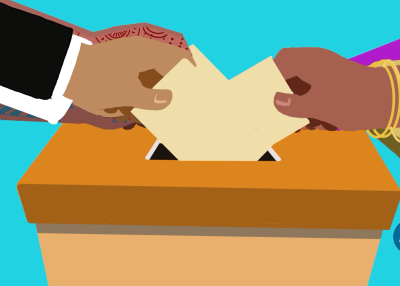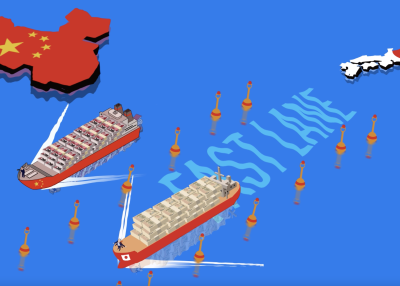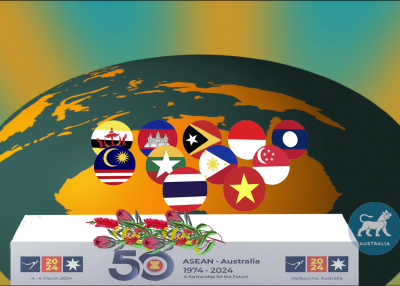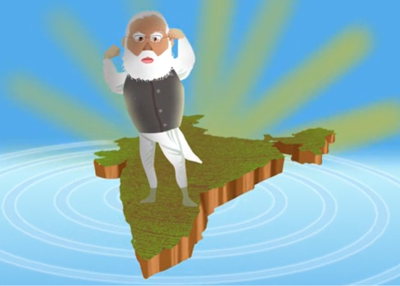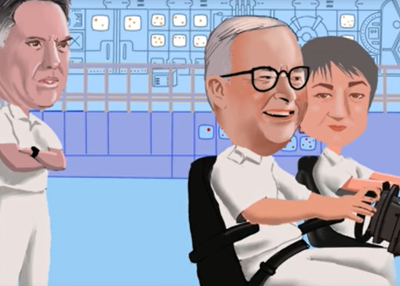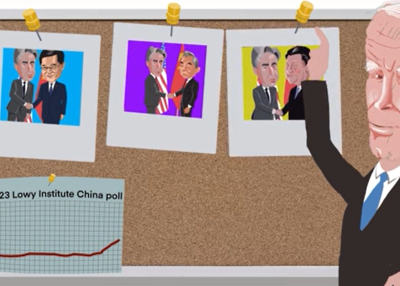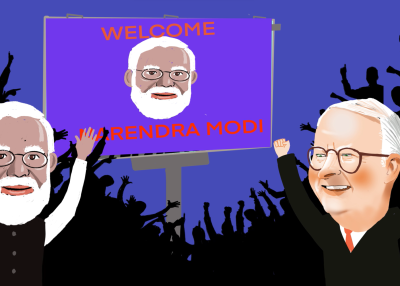Briefing MONTHLY #23 | January 2020
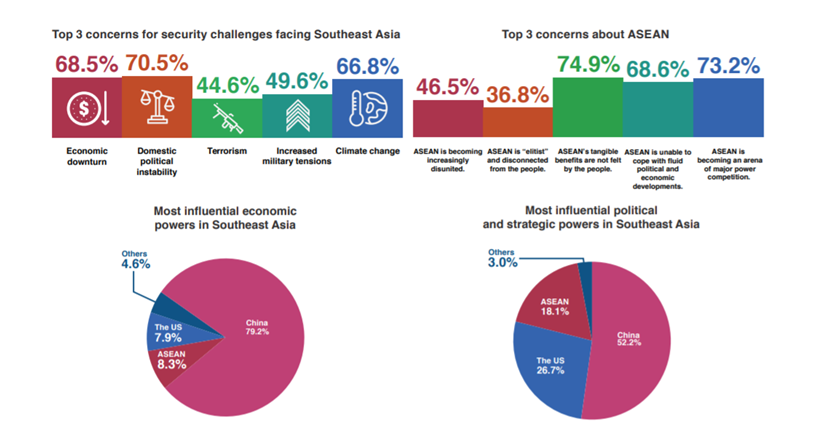
ASEAN’S CHALLENGING OUTLOOK
Only about one third of South East Asian opinion shapers have confidence in the US as a strategic partner forcing regional countries to look to Japan and the European Union as their new interlocutors. But domestic political instability, the economic slowdown and climate change are more pressing issues across the region than terrorism and geo-strategic flashpoints such as the South China Sea and North Korea.
The latest annual survey by the ISEAS-Yusof Ishak Institute reveals how divided the region is over US-China tensions with 54 percent of respondents saying they would choose the US over China in a dispute, despite only 35 percent of respondents having confidence in the US. But respondents from seven of the ten member countries said they would choose China in a dispute in an insight into how the collective Association of Southeast Asian Nations (ASEAN) has trouble maintaining a common position. Irrespective of that choice, China is clearly seen as the most influential economic (79 percent) and strategic power (52 percent) in the region, even though it is distrusted.
Despite Australia devoting increased attention to relations with ASEAN over the past two years, it ranks a distant third (nine percent) as an alternative strategic partner for the region after Japan (38 percent) and the EU (32 percent). Australia was more favoured by respondents from the Philippines and Cambodia, despite it having longer standing relations with ASEAN countries such as Malaysia and Indonesia.
NEIGHBOURHOOD WATCH
Year of the Rat. Animation by Rocco Fazzari via Gfycat
RAT RUNNING
The year of the rat has not started well for China with a new disease epidemic raising old questions about its crisis management capacity. That follows diplomatic setbacks in Taiwan and South East Asia, a further economic slowdown and an uncertain trade deal with the US.
HEALTH: The coronavirus crisis is beginning to impact the Australian economy with Chinese limits on students going overseas likely to hurt education providers and companies exposed to China suffering share price falls. Meanwhile, the Australian government is facing yet another dilemma over the extent of its responsibility for citizens overseas with difficulties arranging an evacuation flight from Wuhan city due to the lack of a diplomatic presence there and resistance to the use of the Christmas island refugee detention centre as a disease isolation facility.
The Lowy Institute’s Richard McGregor says some things have changed since the 2003 SARS epidemic, but tight controls on information flows are still impeding public health management. However, former Asian Development Bank chief economist Shang-Jin Wei says three factors will limit the impact of the epidemic once it peaks in late February.
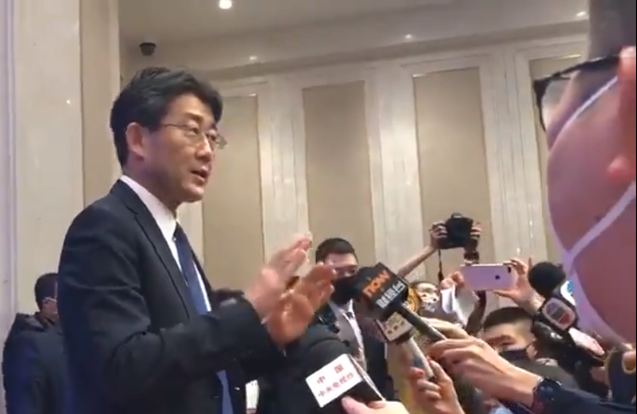
TRADE: The “first stage” US/China trade deal has strongly boosted global financial markets but has generally been seen by trade analysts as unlikely to be delivered entirely, due to tight deadlines and uncertain implementation procedures. Trade Minster Simon Birmingham says Australia will be pressing China to extend concessions to the US on certain products and services to Australian exporters. The Peterson Institute for International Economics has a series of insights into the deal here.
DEMOCRACY: China has been given a lesson in democracy by Taiwanese President Tsai Ing-wen, as it struggles to stabilise the protest movement in Hong Kong. While Tsai’s election victory was expected, the bigger risk for China now is that the KMT opposition party reviews its pro-China policies in an effort to regain domestic support. Dissident younger KMT members are already pushing for changes.
DIPLOMACY: South East Asian countries appear to be suddenly showing greater resolve to stand up to Chinese claims in the South China Sea after years of internal divisions. Indonesia, Malaysia, Vietnam and the Philippines have showed signs of greater coordination over the new year period on negotiating a Code of Conduct with China.
GROWTH: China’s economy was still growing at the psychologically important six percent level at the end of last year, but nevertheless the annual growth of 6.1 percent was the slowest in 29 years. This Reuters poll suggests growth will slip below six percent this year and that was before the impact of the coronavirus crisis was taken into account.
MODI UNDER PRESSURE
Indian Prime Minister Narendra Modi has been both the Teflon man of global populism since his election in 2014 and the great hope of countries – like Australia – seeking to balance China. But January has seen the recent strongman of Indian politics suffer two setbacks which raise questions about whether his best years are behind him. The protests against his government’s citizenship law – which gives non-Muslims from India’s Muslim-majority neighbours a path to citizenship, but excludes followers of Islam – have been unexpectedly persistent given Modi’s strong election victory last year. The way his once strong support base in the Bollywood entertainment community is turning against him is a sign of the times. Meanwhile, the International Monetary Fund has drawn attention to how the country’s growth rate has weakened under Modi by blaming India’s recent sharp downturn for a cut in the agency’s overall global outlook. While Prime Minister Scott Morrison missed an opportunity to pursue new connections with India when he cancelled his planned January visit due to the bushfires, he might have found his Indian counterpart was also distracted by domestic concerns.
- In an interesting parallel to the way Japanese Prime Minister (and Modi ally) Shinzo Abe is often criticised for losing sight of economic reform amid personal political ambitions, this Economic Times article urges Modi to refocus on the economy.
MALAYSIA’S ME TOO
Time will tell, but two decisions by Malaysia’s top legal officials suggest that the country’s judicial system may be stepping back from lurid sex cases. The attorney general Tommy Thomas has withdrawn a criminal defamation charge against a journalist Tashny Sukumaran, who tweeted about her experience of alleged sexual harassment by a male dermatologist in what some see as a MeToo moment for Malaysia. At almost the same time the solicitor-general ruled out new charges against Parti Keadilan Rakyat (PKR) president and potential future prime minister Anwar Ibrahim over allegations that he had sexually assaulted a former male aide, saying there was not enough evidence to proceed. Anwar has faced a series of such allegations which have undermined his political career and described the latest ones as “politics at its worst.”
ASIAN NATION
JOKO WIDODO VISIT
After missing his trip to India due to the bushfire crisis, Prime Minister Scott Morrison will get a chance to build his regional diplomatic links in early February when Indonesian President Joko Widodo makes a long-delayed trip to Australia. Widodo will address a joint sitting of Parliament on February 10 in the first such address by an Indonesian leader since President Bambang Susilo Yudhoyono in 2010. Widodo will also bring a substantial business delegation to underline his focus on increasing foreign investment in Indonesia to boost economic growth. But the real business momentum surrounding the trip may well depend on whether the Indonesian legislature now ratifies the trade agreement between the two countries which was signed last year. The elections in the two countries last year meant the annual formal leaders meeting was not held for the first time in a decade.
THREE NEW AMIGOS
Australia, India and Indonesia are presented as the three multi-ethnic, multi-cultural democracies at the real heart of the Indo-Pacific idea in a new study which advocates more tri-lateral cooperation. It calls for stronger bilateral ties to lay the foundations for greater trilateral cooperation, and sets out projects that could bring that three-way cooperation to life. “If the Indo-Pacific view of the world is to prove meaningful, these three anchor nations will need to find new ways to deepen their strategic conversation and their practical cooperation across a wide range of areas,” the study by the Lowy Institute, India’s Observer Research Institute, and Indonesia’s Centre for Strategic and International Studies says. It argues that while this sort of cooperation has been talked about for some time, the activities so far “have not been designed strategically nor have they been part of a broader trilateral framework.”
APEC: BACK TO THE FUTURE
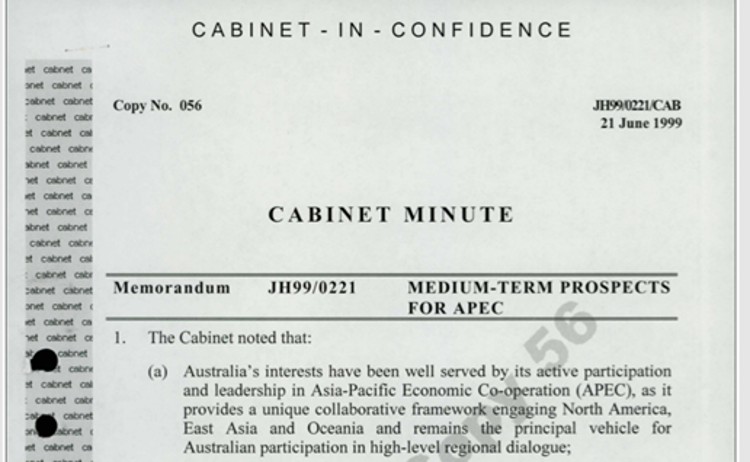
With the Asia Pacific Economic Cooperation (APEC) group facing a third strike over its future value this year, the newly released Australian government Cabinet papers from 1999 underline how this has been a perennial issue for Australia’s Asia policy. By that year APEC – which Australia helped found – had been undermined by the 1997 Asian financial crisis, an unsatisfactory annual summit in Malaysia in 1998, and the expected launch of a new World Trade Organisation negotiating round. At the same time the previously secret Cabinet papers say that Australian policy makers were concerned that the regional focus of both Japan and US was “drifting” and a revived APEC was a way for Australia to re-engage them. The push for new regional groups that would include Australia also clearly alarmed the government with Cabinet deciding that “pressures in the regional environment, including interest in regional groupings which would exclude Australia, suggest APEC continues to warrant high priority attention.” This year the APEC summit will return to Malaysia amid political leadership uncertainty there and after last year’s cancelled summit in Chile.
RERANKING CHINA
Swinburne University China expert John Fitzgerald has challenged Western universities to pull out of the increasingly prestigious Chinese-run Academic Ranking of World (ARWU) Universities in a bid to defend academic freedom and institutional autonomy. Writing in The Australian, Fitzgerald said Western universities should be defending freedom of thought and inquiry and institutional autonomy when dealing with China. But the ARWU, which was created at Shanghai Jiaotong University in 2003 and measures research performance, is increasingly regarded as the world’s most prestigious university ranking. It competes with systems prepared by Times Higher Education and QS. Fitzgerald’s call is a challenge for Australian universities because seven have achieved top 100 status in the ARWU, which helps them draw Chinese and other international students to Australia. But Fitzgerald asks: “How can we have a credible international ranking system from a country that is thumbing its nose at the fundamental principle of a liberal university?”
DEALS AND DOLLARS
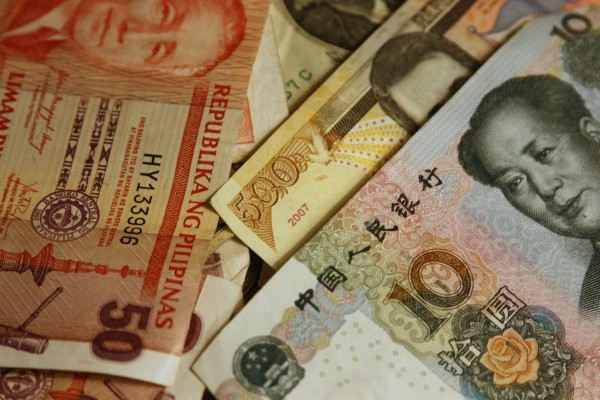
COLES TARGETS CHINA
Coles has stepped up its focus on China by lodging a new trademark to facilitate selling more meat products to affluent Asian buyers. The company filed a trademark for a Coles logo that includes three Chinese characters (客澳市), that translate to "customer Australia market", in December. The trademark's categories included vitamins and supplements, coffee, preserves and meat. The submission steps up Coles' long-held strategy for Chinese food exports, which it plans to increase over the next five years. China has been one of the supermarket’s largest markets for some time, and Chinese demand for high-quality Australian goods has been increasing.
MITSUI ON THE PROWL
Japanese trading house Mitsui has flagged plans to invest another $3.5bn in expanding its operations in Australia after spending $2.5 billion last year. The company estimates it has invested $15 billion in the past 15 years across iron ore, LNG, coal, oil and gas, power generation, construction and mining machinery, chemicals, steel products, woodchips, salt, beef and financial services. The company’s Australian chief executive Noburu Katsu told The Australian that he saw investment opportunities in the Western Sydney Airport, future rail projects, energy, coal, beef and lithium mining. He said the company was also looking investments in new sustainable technologies being developed by Australian companies like the agreement it reached with Melbourne wheel manufacturer Carbon Revolution to provide help sourcing inputs and getting into the Japanese market.
NEW MALAYSIA BLOW FOR LYNAS
Rare earths producer Lynas is facing another obstacle to its politically controversial processing operation in Malaysia, with three Malaysian citizens starting a legal challenge to the government’s approval of the processing. Last year Prime Minister Mahathir Mohamad ignored an election promise and members of his government to approve the operation if toxic waste was removed offshore. But the legal challenge claims the right procedures were not followed in that decision. Lynas expressed confidence the decision would stand saying the litigants had previously taken legal action against it.
SNACKS FOR ASIA
Australia’s largest manufacturer of healthy children’s snacks is trying to extend its reach into South East Asia. Whole Kids, which produces certified organic and additive-free children's food, recently signed a deal with Singapore’s largest grocery chain, NTUC FairPrice, where it will launch its products in 2020. Chief executive Monica Meldrum told The Australian Financial Review: “We are really looking to cement our position as the leading health brand in Australia and south-east Asia. Hong Kong and Singapore are great markets for product development and as a springboard to China.”
HUAWEI BAN COST
Chinese telecommunications company Huawei claims its ban from providing equipment to 5G networks in Australia will cost $11.9 billion in lost GDP gains by 2035. A report it commissioned from Oxford Economics finds that the ban will increase local operators’ deployment costs by up to $440 million annually over the next 10 years, due to their need to rely on equipment from more expensive rivals like Ericsson and Nokia, and will mean up to 3.1 million Australians will have delayed access to 5G by 2023. The study, reported in The Australian Financial Review, is the latest move from Huawei to gain public and political support for a relaxing of restrictions against it regarding 5G, which were put in place in 2018 due to fears related to national cyber security. It was similarly banned from involvement in Australia's national broadband network in 2012.
DIPLOMATICALLY SPEAKING
“We could close down every single power generation facility in the country and those emissions would be taken up by China in about nine days.”
- Australian Prime Minister Scott Morrison
DATAWATCH
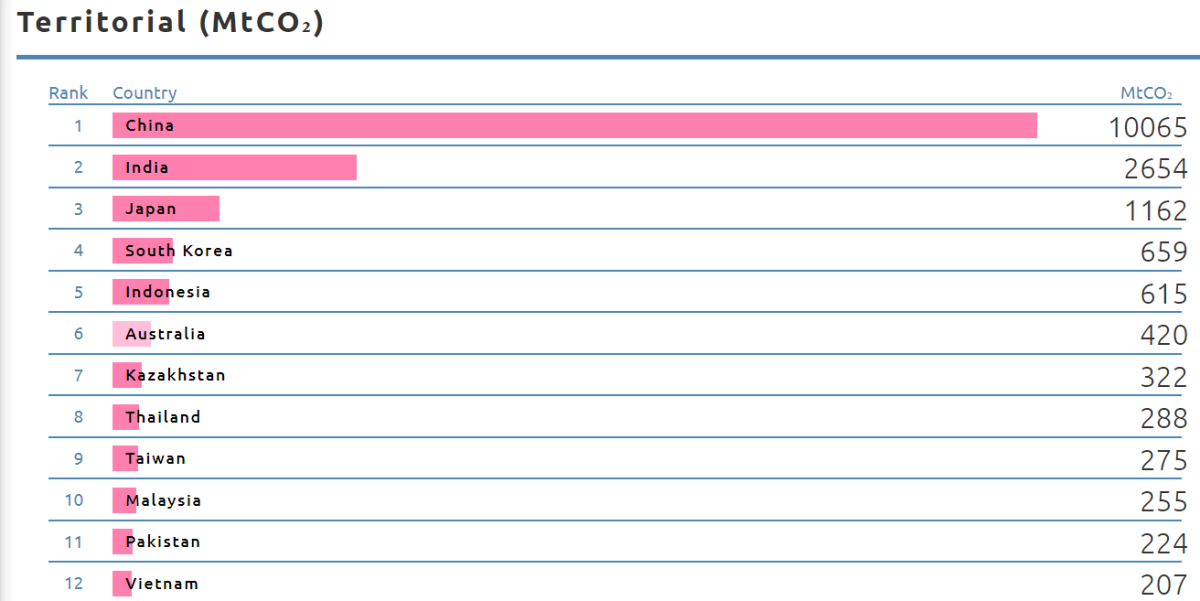
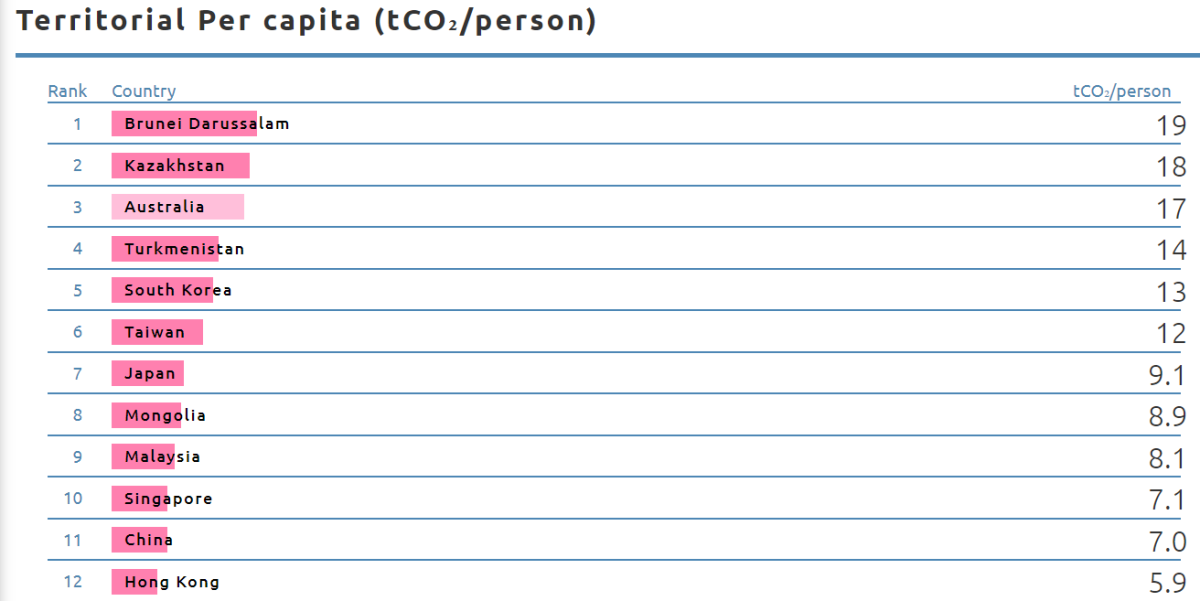
Asia CO2 emissions, first by total and then per capita. Charts generated from the Global Carbon Atlas interactive data imaging website.
WHAT WE'RE READING
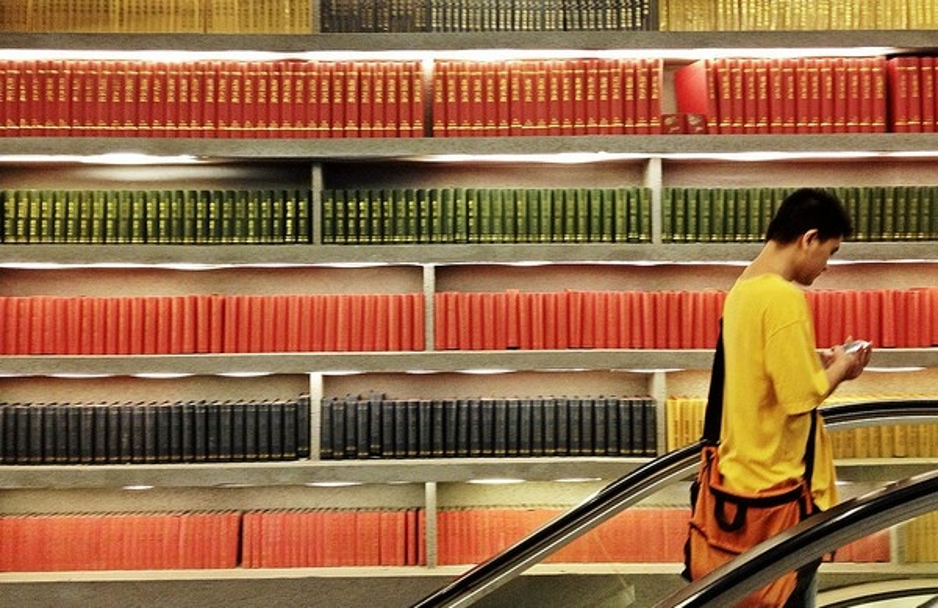
NEW KINGS OF THE WORLD by FATIMA BHUTTO (Columbia Global Reports)
We all know the world is awash with people moving – from homeless refugees to globe-trotting netizens. But Fatima Bhutto says that when it comes to modern popular culture, it is the people moving within their home countries who are really changing the world. She says three quarters of the billion people who leave home in search of a better life each year remain in their country. But she writes: “The journey from tradition to modernity is neither inevitable or painless; on the contrary it is accompanied by profound turbulence.”
This is the core of her very readable account of the rise of a new popular culture across the developing world which is rejecting the conventional wisdom of a homogenised American culture dominating the world. “How does one thrive in a modern competitive environment while still retaining traditional values? … How does one participate in a dog-eat-dog world without sacrificing one’s identity, family or culture? … These questions are no longer satisfactorily answered by American or western pop culture,” she says.
This fast-paced book then journeys through Bollywood in India (and its Latin American offshoots), Turkey’s remarkably successful export of its dizi television programs, and then Korea’s K-Pop music industry. It introduces a series of stars and producers who rival the reach of Hollywood image makers and successfully cross national boundaries, reflecting a common appetite for music and television that retains some traditional cultural values in modern setting.
This mix of neo-liberal economics (both in the industry structure and the content) and some traditional values does raise questions about whether this is just entertainment for the masses to keep them working in a capitalist economy, and so really no different to Hollywood culture. As Bhutto puts it: “Audiences see no conflict between a distinctly Eastern morality deprived of traditional imagery and set instead against a backdrop of Western cityscapes, lush with consumerist symbol of plenty.” This tension between secular and conservative fidelities, she argues, speaks to many in the Global South today. These may well be the underlying cultural values of a new multi-polar world.
GALLERY
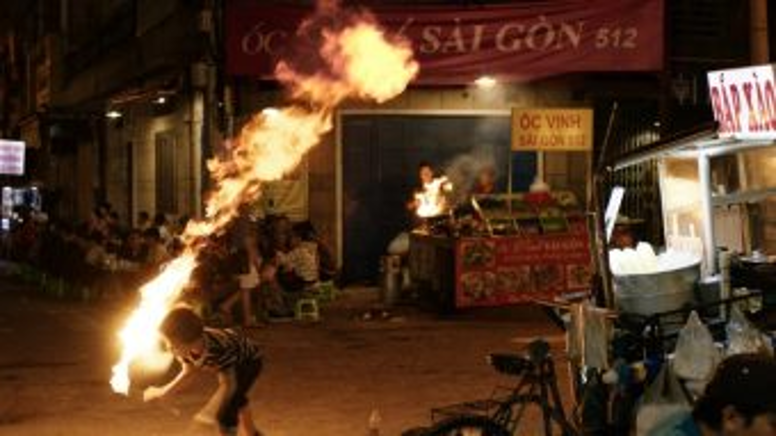
ASEAN ON SCREEN
A Vietnamese film which has already received attention at world movie festivals has won the inaugural award for a South East Asian film at the Flickerfest Short Film Festival. Stay Awake, Be Ready charts Vietnamese street life through the conversation of three men one night amid the chaos of a roadside café in Ho Chi Minh City. The runners up were a romantic sci-fi Lao production The Tuk Tuk of the Fifth Kind and a Filipino film about a poor teenager Limbo. Flickerfest received more than 500 entries from across South East Asia for the competition which was supported by the Department of Foreign Affairs and Trade Australia Now promotion in the ASEAN region over the past year. The short films from the ten ASEAN finalists will be rescreened during the Canberra Flickerfest in April.
ON THE HORIZON
CRUNCHTIME FOR AID
The Federal government’s snap development aid review will get under way in earnest from February, with the deadline for submissions having closed at the end of January. The review is tasked with coming up with some new ideas and principles by Federal Budget time and has emphasised the need for efficiency, with a five-page limit for the submissions. Curiously the announcement of the review made no mention of climate change, instead emphasising the newer focus on building infrastructure and non-cash aid initiatives such as the Pacific labour mobility program. That possibly reflected the stand-off that has occurred between Prime Minister Scott Morrison and some regional leaders over Australia’s approach to climate change. But the holiday bushfire crisis may well have put more pressure on the government to win hearts and minds in the Pacific on climate change given the broader public relations pasting it has received around the world over its climate change policies.
ABOUT BRIEFING MONTHLY
Briefing MONTHLY is a public update with news and original analysis on Asia and Australia-Asia relations. As Australia debates its future in Asia, and the Australian media footprint in Asia continues to shrink, it is an opportune time to offer Australians at the forefront of Australia’s engagement with Asia a professionally edited, succinct and authoritative curation of the most relevant content on Asia and Australia-Asia relations. Focused on business, geopolitics, education and culture, Briefing MONTHLY is distinctly Australian and internationalist, highlighting trends, deals, visits, stories and events in our region that matter.
Partner with us to help Briefing MONTHLY grow. For more information please contact [email protected]
Read previous issues and subscribe >>

